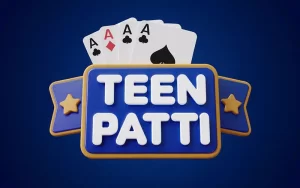Indian poker, a captivating variant of the traditional poker game, has become increasingly popular both in India and around the world. With its roots deeply embedded in poker traditions, this game offers a unique blend of strategy and chance. This article explores the fundamentals of Indian poker, including its rules, the poker scene, and the growing trend of online.
What is Indian Poker?
Poker is a local adaptation of the classic poker card that has gained a significant following in India. Like its international counterparts, it revolves around the central concept of making the best hand possible from a combination of cards. However, poker has its own distinct variations and rules that set it apart from other poker games.
The Basics of Poker Card Game
At its core, the poker card involves players betting on the strength of their hands. The game typically uses a standard 52-card deck, and the objective is to win chips or money by either having the best hand at showdown or by convincing other players to fold. The standard hand rankings in poker online include:
- Royal Flush: The highest possible hand, consisting of A, K, Q, J, and 10, all of the same suit.
- Straight Flush: Five consecutive cards of the same suit.
- Four of a Kind: Four cards of the same rank.
- Full House: Three of a kind plus a pair.
- Flush: Five cards of the same suit, not in sequence.
- Straight: Five consecutive cards of different suits.
- Three of a Kind: Three cards of the same rank.
- Two Pair: Two pairs of different ranks.
- One Pair: Two cards of the same rank.
- High Card: The highest card in your hand if no other hand is made.
Rules of Poker
Understanding the rules of poker is crucial for anyone looking to master the game. While the basic rules are consistent across most poker variants, each game can have its own specific rules and nuances. The fundamental rules generally include:
- Betting Rounds: Poker games are divided into several betting rounds where players can check, bet, raise, or fold.
- Blinds and Antes: In games like Texas Hold’em, blinds are used to initiate betting. In other games, antes are required from all players to start the betting.
- Community Cards: In games like Texas Hold’em and Omaha, community cards are dealt face-up and shared among all players.
- Showdown: At the end of the betting rounds, players reveal their hands to determine the winner.
Indian Poker vs. Global Poker
Indian poker shares many similarities with global poker but also features distinct variations. While traditional poker games like Texas Hold’em and Omaha dominate the poker scene, poker incorporates local elements and adaptations that cater to regional preferences.
Indian Poker often involves unique rules and variations that reflect the cultural and social aspects of India. These might include specific betting structures, card combinations, or house rules that are not commonly found in international versions of the game. The rise of poker has introduced poker players to a broader audience, leading to a fusion of traditional and modern poker styles. This exchange of ideas has enriched the game, providing players with a more diverse range of strategies and experiences.
The Growth of Poker Online

The advent of online gaming has transformed the way people play poker. Poker platforms offer players the convenience of participating in games from their homes, as well as access to a wide range of poker variants and tournaments. This has significantly contributed to the global popularity of poker, including Indian poker.
- Accessibility: Online poker platforms have made it easier for players to access games at any time. Whether you’re a casual player or a serious competitor, online poker offers a range of options to suit your needs.
- Variety: Many online poker sites offer different variants of poker, including poker, allowing players to explore new styles and strategies.
- Tournaments: Online poker platforms frequently host tournaments with significant prize pools, providing players with opportunities to compete on a global stage.
- Learning and Strategy: Online platforms often provide resources for learning the rules of poker and developing strategies. Players can access tutorials, strategy guides, and practice games to improve their skills.
The Impact of Technology on Indian Poker
The integration of technology in poker has revolutionized the gaming experience. Online poker platforms and mobile apps have made the game more accessible than ever. Players can now enjoy poker from their smartphones, allowing them to play anytime and anywhere. The technological advancements also include real-time tracking of games, sophisticated algorithms for fair play, and enhanced security measures to protect players’ data and funds.
Tips for Success in Indian Poker
To succeed in Indian poker and other poker card, consider the following tips:
- Understand the Rules: Familiarize yourself with the specific rules of the game you are playing. This includes understanding betting structures, hand rankings, and any unique aspects of poker.
- Practice Regularly: Regular practice helps improve your skills and strategies. Whether you’re playing online or in-person, frequent play will enhance your understanding of the game.
- Study Opponents: Pay attention to your opponents’ playing styles and tendencies. This can provide valuable insights into their strategies and help you make better decisions.
- Manage Your Bankroll: Effective bankroll management is crucial for long-term success. Set limits for your play and avoid chasing losses.
Conclusion
Indian poker, with its blend of traditional and modern elements, offers a unique and engaging experience for players. Whether you’re playing a local version or exploring poker through online platforms, understanding the rules, practicing regularly, and staying informed about the latest developments can enhance your gameplay. Embracing the poker card game scene and participating in poker allows you to experience the game in new and exciting ways, making your poker journey both enjoyable and rewarding. As technology continues to evolve, the future of poker looks promising, with new opportunities for players to engage with this dynamic and thrilling game.







